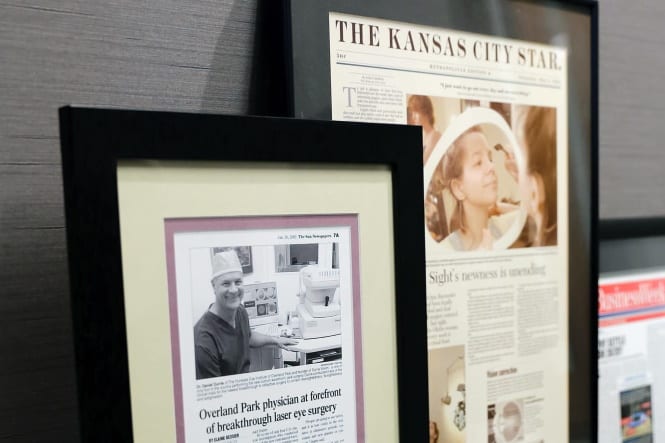Our Founder Paved the Way for Today’s Laser Vision Correction Procedures
Although Dr. Daniel Durrie is no longer serving patients in the practice that bears his name, his contributions to vision correction for the past 45 years continue to serve as his legacy here in Overland Park, Kansas.
Dr. Durrie retired from patient care at Durrie Vision in 2019, but not before developing laser vision correction techniques that are now in use all over the world.
Dr. Durrie founded his Kansas City practice, not only to help people improve their vision, but also to serve as a clinical research site for the best vision correction treatments, including LASIK surgery, cataract surgery, and refractive lens exchange.
Our story is a long one, but the ultimate takeaway is that our practice has long been integral in the development and medical acceptance of a variety of vision correction procedures.
About Daniel Durrie, MD, a Laser Vision Correction Pioneer
Dr. Durrie is an internationally-renowned refractive surgeon with more than 50,000 procedures completed during his career. His name is on more than 150 peer-reviewed scientific journal articles, and he’s passed down his immense knowledge to the eye surgeons working today at Durrie Vision.
He served as a medical monitor for nearly every clinical trial prior to FDA approval of laser eye procedures and is in the top ten refractive surgeons in America, according to Ophthalmology Times and one of 50 of the most influential ophthalmologists in the world, according to Cataract and Refractive Surgery magazine.
Today, Dr. Durrie spends his time developing office-based surgery suites designed to provide personalized patient care; working with his nonprofit, which offers laser vision correction to individuals whose physical disabilities preclude them from handling eyeglasses or contact lenses; and serving as the director of refractive surgery at the University of Kansas Medical Center.
Durrie Vision Serves as a Clinical Research Site
Our eye surgeons have served as investigators or medical monitors in more than 200 Food and Drug Administration (FDA) clinical studies and conducted their own in-house studies to improve patient outcomes.
In 1999, prior to developing SBK, Durrie Vision served as a clinical research site for Laser-Assisted in Situ Keratomileusis (LASIK surgery). The procedure is the traditional version of modern LASIK and required an excimer laser and manual blade to correct refractive error. This type of LASIK is no longer used, also thanks to Dr. Durrie and his work on SBK.
The clinical research continued in 2003, when refractive lens exchange received its approval for presbyopia correction via intraocular lenses from the FDA. And in 2005, more implantable lenses were approved, this time the Phakic Intraocular Lens, or Phakic IOLs. For this vision correction surgery, the lens is placed behind the iris, but in front of the natural lens, to treat severe myopia.
More Current Laser Vision Correction Clinical Research in Overland Park
When KAMRA corneal inlays, a solution for presbyopia, received FDA approval in 2015, the team at Durrie Vision spent years conducting clinical research for the procedure. And before 2016, when Corneal Collagen Cross-Linking, or CXL earned FDA approval to treat keratoconus, a progressive corneal disease, Durrie Vision dedicated time to research, too.
Before the 2017 FDA approval of topography-guided LASIK, Durrie Vision hosted clinical research for this vision correction procedure that relies on detailed measurements of the patient’s corneal surface, resulting in a more personalized laser surgery experience.
Dr. Durrie’s Role in Vision Correction Developments
Driven to help Kansas City-area residents see better, Dr. Durrie was the first to perform groundbreaking vision correction procedures, right here in Overland Park, Kansas.
One such procedure was in 1995, when Dr. Durrie performed the first Photoreactive Keratectomy (PRK) in the U.S. following FDA approval. The procedure was the first of its kind, involving ablating the surface of the eye before using an excimer laser to reshape the cornea.
Then, in 2002, Dr. Durrie, along with Dr. Stephen Slade, developed Sub-Bowman’s Keratomileusis (SBK) Advanced LASIK, which uses a femtosecond laser rather than a manual blade to create a flap in the cornea, and an excimer laser to reshape it. The procedure set a new standard for laser vision correction because it is safer and more precise. It is today’s version of LASIK surgery.
Dr. Durrie Passes on His Laser Vision Correction Practice
When Dr. Durrie retired from patient care, he left Kansas City in good hands, ensuring his expertise and knowledge continued to serve patients here. Today, two refractive surgeons and an optometrist help Durrie Vision’s patients see better.
Both Dr. Jason E. Stahl and Dr. Timothy P. Lindquist specialize in laser vision correction and lens implant surgery, including refractive lens exchange and refractive cataract surgery. Dr. Stahl was named one of Kansas City’s “Top Doctors” in Ingram’s magazine, and Dr. Timothy P. Lindquist dedicated a portion of his medical career to researching pediatric eye disease.
Dr. Kelly F. Grosdidier focuses on caring for patients before and after vision correction surgeries. Dr. Grosdidier has been with Durrie Vision since 1999 and is an active part of our clinical research trials and surgery care.
See Better at Durrie Vision
Take advantage of the decades of expertise in patient care and groundbreaking eye surgeries when you get laser vision correction at Durrie Vision in Overland Park, Kansas.
To find out if you’re a candidate for one of our procedures, take our quick online quiz. Or, request a consultation right away to meet with one of our providers to learn more about your options to improve your vision and likely ditch your eyeglasses or contact lenses for good.

Author Bio: Jason E. Stahl, MD
Top Doctors: https://www.castleconnolly.com/top-doctors/jason-e-stahl-ophthalmology-129cc002150
Best Cataract Surgeons: https://bestcataractsurgeons.com/cataract-surgeons/jason-e-stahl/

